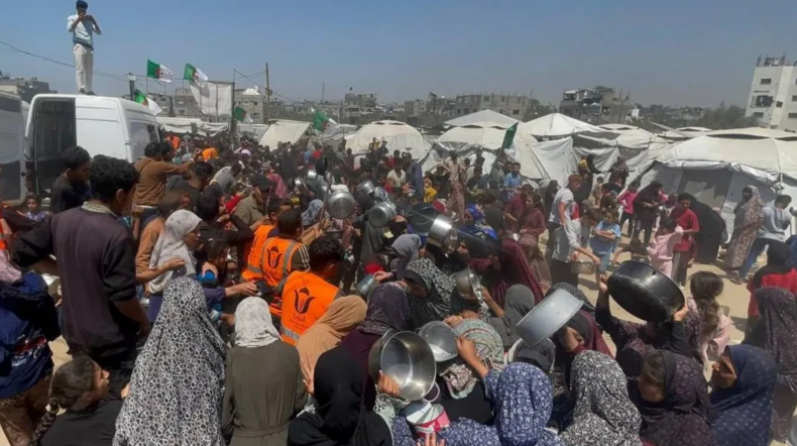The Palestinian Authority has categorically rejected a new U.S. plan aimed at distributing humanitarian aid in the Gaza Strip through private companies, calling the move "an attempt to bypass UN institutions and undermine the role of the United Nations Relief and Works Agency for Palestine Refugees (UNRWA) and national institutions operating in the sector."
Hussein Al-Sheikh, Deputy Chairman of the Executive Committee of the Palestine Liberation Organization, stated that "the national priority at this stage is to halt military operations, provide urgent relief, release hostages and detainees, and ultimately achieve Israeli withdrawal from Gaza and engage in a political process based on international legitimacy and the two-state solution."
The Palestinian government renewed its call on the international community to exert effective pressure on Israel to open the crossings and ensure the flow of aid to Gaza residents in accordance with international humanitarian standards.
U.S. Ambassador to Israel, Mike Huckabee, had revealed that President Donald Trump's administration was preparing a “new system” for aid distribution in Gaza. This includes establishing "distribution centers" managed by private companies supported by security contractors to provide food, water, and essential supplies to about one million Palestinians in the initial phase.
Huckabee emphasized that Israeli forces would not handle the distribution operations but would secure the perimeter of the centers. He claimed the aim was to "prevent Hamas from stealing the aid."
He added that "President Trump considers relief for Gaza a pressing necessity, and his team will spare no effort in accelerating the pace of support," noting that the administration is working to mobilize Gulf financial backing for the initiative ahead of a planned visit by Trump to the region.
In contrast, the United Nations expressed its rejection of what it described as a "controversial plan," asserting that such measures "endanger civilian lives and violate humanitarian principles." It emphasized that Israel is using aid as a "bargaining chip" against the besieged population.
James Elder, spokesperson for UNICEF, stated that "the Israeli proposal to establish a handful of distribution centers in the south would force people to choose between displacement and death," adding that "aid must not be used as a negotiating tool in conflict zones."
Meanwhile, Jens Laerke, spokesperson for the UN Office for the Coordination of Humanitarian Affairs (OCHA), warned that the new aid distribution plan "does not align with the core principles of any humanitarian organization," considering it "an existential threat to neutral humanitarian work, not only in Palestine but in conflict zones worldwide."
In a related development, a leaked document obtained by the BBC revealed the registration of a new entity called the "Gaza Humanitarian Foundation" (GHF), which plans to implement the U.S. plan by establishing four centers to distribute food, water, and hygiene supplies to about 1.2 million people—around 60% of Gaza's population.
The document indicated that the foundation aims to "reactivate relief efforts through an independent model subject to strict review mechanisms," though it did not provide clear details about field operations or how neutrality would be guaranteed.
For its part, UNRWA confirmed that over 3,000 aid trucks have been parked near Gaza for weeks without being allowed entry due to the complete Israeli blockade imposed for nearly three months.
Juliette Touma, UNRWA’s Director of Communications, said, "Time is running out, and the gates must be opened immediately." She added, "We have food and medicine, but we cannot bring it in. Food centers in Gaza have shut down because they have nothing left to distribute."
She also revealed unprecedented spikes in food prices, with a 25-kg bag of flour reaching $415—more than 30 times its usual price.
According to UN data, more than 80 community kitchens in Gaza ceased operations since late April due to supply shortages, exacerbating the hunger crisis. Estimates suggest that around 60,000 children are suffering from acute malnutrition.
In northern Gaza, Palestinian families in Jabalia expressed despair over the possibility of obtaining even a single meal, whether from soup kitchens or charitable restaurants, amid chaos and the total collapse of humanitarian support networks.
In response to accusations by Israel and the United States that Hamas is seizing aid, UNRWA and the World Health Organization proposed comprehensive, monitored “door-to-door” delivery systems to ensure aid reaches rightful recipients.
Margaret Harris, spokesperson for the WHO, stressed that "the problem is not with distributing aid within Gaza, but with getting it in to begin with," calling for an end to the blockade and unrestricted aid flow.
The war in Gaza erupted on October 7, 2023, following a Hamas attack on southern Israel that killed around 1,200 people and resulted in the abduction of 250 others, according to Israeli sources. In response, Israel launched devastating military operations that have killed over 52,700 people in Gaza, most of them women, children, and the elderly, according to the Palestinian Ministry of Health.
International relief organizations warn that the continued blockade and obstruction of aid deliveries could lead to an unprecedented humanitarian catastrophe in the besieged strip.






Comments